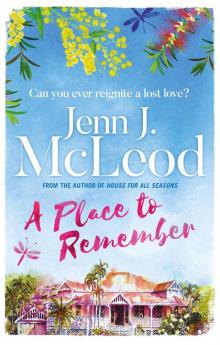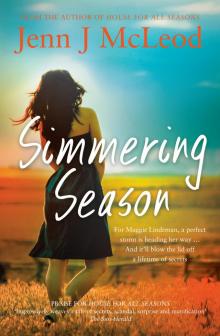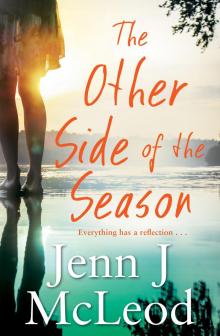- Home
- Jenn J. McLeod
Other Side of the Season Page 25
Other Side of the Season Read online
Page 25
‘Chuck the bike in the back and hop in, boy,’ Ulf called, tapping Tilly on the leg and indicating she should scoot into the centre of the bench seat. ‘She’s too hot to be tackling the mountain on foot today.’
‘Thanks, Mr Marhkt.’
The clatter of David’s bike hitting the metal of the back tray startled Tilly and Ulf again placed a hand on her knee, rubbing back and forth. ‘No need to be scared anymore. You’re safe with us.’
The door opened and David clambered into the car, the colourful bouquet of paintbrushes from his back pocket now clutched in one hand with his scrunched hat.
He looked at Tilly and smiled. ‘You her?’
Tilly shrugged. ‘What if I am?’
‘This is Tilly,’ Ulf said. ‘Albie’s new sister.’
‘Lucky Albie!’ David muttered, his face turned towards the side-view mirror. He was staring right at her reflection in the glass.
‘David is starting high school next year. He does some clever things with those paintbrushes of his and plans on being a famous artist one day, so Albie tells me.’
‘I like to draw, too’, Tilly said, feeling that competitive spirit stir. ‘If only I had paint and paintbrushes.’
‘I can lend you some of mine. I’ve got loads,’ David said as Ulf pulled up at a fork in the road where two sets of car tracks disappeared under the dark canopy of the biggest, greenest leaves Tilly had ever seen.
‘You’ll be right from here,’ Ulf told him.
The boy jumped from the ute and grabbed his bike from the tray, and as they drove away he called out, ‘I’ll see you around, Tilly.’
Tilly scooted hard up to the passenger door and hung out the open window to stare back at him, mumbling, ‘Yes, you will.’
• • •
Natalie let her daughter’s car idle for a moment at the same fork in the road while she turned the heater down. With her heart madly pumping blood through her veins, there was little chance of feeling the cold, even though the day had turned bleak.
When she and Matthew had left Greenhill that winter’s night back in ’79, they’d made a pact never to think about the past, never to look back. Natalie had tried to forget David–at first to spare herself the pain, and later out of loyalty to Matthew–but she had never stopped missing him. Unable to control where her mind went at night, he often came to her in dreams. When she learned he was still alive, the nighttime fantasies had become even more vivid, with an intensity of feeling she hadn’t experienced in her relationship with Matthew.
She felt guilty even now just being back on the mountain, as if she were betraying her husband. But hadn’t Matthew also broken their pact by secretly keeping in touch with his brother? As she shifted the car into gear, veering left towards the Greenhill property, Natalie prepared to meet her past as she’d done so many times in those dreams.
As the old residence came into view, she braked heavily, bringing the car to a lurching stop that jerked her sunglasses from the top of her head down onto her nose. What young Tilly had once considered posh and imposing now looked unimpressive and unloved, and the yard she surveyed for signs of life was a lot less formal than when Rose had lovingly tended the garden beds.
She wasn’t sure what she’d expected to find, but not this place. Greenhill–the version she remembered–was no more. In fact, the house and the gardens looked so different that Natalie could easily have persuaded herself she had no connection to this place and got out of there before she found herself sucked like Alice through the Looking-Glass into a surreal world where everything could go terribly wrong.
With David nowhere in sight, the urge to turn the car around and head down the mountain and straight back to her children strengthened Natalie’s grip on the steering wheel. She breathed deep and slow, in and out, trying to calm herself. There wasn’t a single reason to stay that made any sense. But it was too late to change her mind. The man she’d never stopped thinking about–how could she when every day seeing Sidney had reminded her?–had just emerged from the fancy-looking addition to the main house and was making his way, awkwardly and on crutches, towards her car.
Ten seconds, she told herself. Ten seconds to turn over the engine, to engage the gears, to be gone, and to leave David none the wiser about her return to town. He might recognise the car, but he didn’t know her. He obviously hadn’t recognised her at the breakwall yesterday. And why would he? Natalie could not be more different to the wild young thing in the cave on that cold winter day, the girl he’d wanted to marry. The memory relaxed Nat’s grip on the ignition key and she collapsed back into the leather car seat, breathing deeply before alighting from the car. She kept a firm hold on the door, unsure if she was trying to stop herself running from him or to him.
David had faltered–probably when he realised she wasn’t Sidney. But any hesitation she thought she’d witnessed was short-lived, replaced by a determined stride.
‘I did wonder,’ he said, stopping short of the car, his voice guarded. ‘Down there on the breakwall–’
‘Hello, David.’ She removed her sunglasses.
‘Hello?’ He shrugged, his tone laced with sarcasm. ‘That’s it? After all these years? Hello?’
‘It’s a start, isn’t it? I don’t know how else–’
‘Maybe try something like I’m sorry I ran off and left you for dead.’
This could not be further from the meeting in her dreams: the loving embrace, the warm whisper–tender words of forgiveness.
‘I’m not here by choice.’ His expression made her regret those words immediately. ‘Sorry, that came out wrong. What I meant to say was I’m here because–’
‘Are you planning on hugging that car door all day?’
‘What?’ Her grip loosened slightly.
‘Maybe you’re planning on getting back in?’
‘Should I go?’
‘Best you make a choice,’ he said as he shifted on his crutches, preparing to walk away. He clicked his tongue to urge the small dog at his feet to follow.
Was that it? Was he telling her she wasn’t welcome?
Damn the man!
‘David?’ she called after him, her voice unwavering. ‘I was asking if you want me to stay.’
This time he paused, stopping to look over his shoulder at her and to smile for the first time. ‘If you’d asked that question thirty-five years ago, my answer today would be the same.’ He took a few more steps before looking back again. ‘I was about to make tea. I’m acquiring a taste for the stuff and I’ve recognised a bit of practice is needed.’ He continued towards the house. ‘Should you decide to stay, I’ll be in the kitchen.’
‘Wait!’ she called. ‘I’m not leaving here today without you knowing.’
David didn’t turn around this time. ‘Knowing what?’
‘That I didn’t have a choice back then.’
He twisted his body a little and steadied himself before speaking. ‘There’s always a choice, Tilly. Do I call you Tilly, still?’ For a while they simply stared at each other–three metres and three decades between them.
‘I’ve missed Tilly,’ was all she said.
‘I’ve missed her too.’ He turned and kept walking.
Natalie followed behind until they were on the wide veranda of the main house. ‘Look, David, I can apologise–for all the good that will do. But we can’t go back.’
‘That much I do know,’ he said, ‘even though for a long time I prayed for nothing else.’
Natalie thought about those little pink pills she’d wished could take her back to when she’d been five, ten, fifteen years old. If only a drug like that existed. As much as she’d despised drug taking her entire life–a hangover from her mother’s life-destroying addiction–she’d take anything right now if it meant she could undo all the hurt she’d caused. There was so much to say, to purge herself of every wrongdoing, to justify every wrong decision.
‘We need to talk, David. There’s so much to say.’
‘Well, y
ou’d best come into the kitchen.’ He was on the move again, calling back over his shoulder. ‘I’ll make lots of tea.’
41
Watercolour Cove, 2015
‘David, you have to know. I thought you were dead.’ The empty cup and saucer he handed Natalie clattered, betraying the trembling of her hands.
‘I wasn’t expected to live,’ he returned. ‘My parents were told to prepare for the worst. But I showed everyone.’
‘I suppose you did.’ Remembering the spirited young man who’d defied his parents by sneaking out to see her at night made Natalie feel something she hadn’t expected about their meeting–optimistic. ‘Let me help with the tea.’
‘No, thanks. I’ve been managing on my own for a long time, Tilly. Although, lately, tea for two seems to be more challenging than it should be.’ David moved about the kitchen easily, aided by a single crutch, while his other hand leaned on the solid countertop.
This room was bigger than she remembered, no longer the cosy country kitchen in which Rose had cooked her array of sweet treats–always with banana.
Always bloody bananas!
Now David was opening a Tupperware container of biscuits and sliding it towards Natalie.
‘None for me, thank you,’ she said politely. ‘Your little friend looks keen for a treat, though.’
‘Pablo! Bed!’ David ordered before turning back to his tea-making task.
‘Are you sure I can’t help?’ she asked when David seemed to fumble just filling a kettle with water.
He didn’t answer, avoiding her gaze, his eyes fixed on the kitchen window overlooking an abundant vegetable garden. ‘You think I look awkward now? So much wasn’t easy in the beginning.’
‘Oh?’ With the grey day outside, and lights illuminating the kitchen, she could see his reflection in the window and observe him without staring.
‘Nights in the hospital were hardest. The dark. The silence. I remember being so scared of dying. Even more terrifying was the thought that I might live and lose control of everything. Did you know it took me two months to even sit up?’ He turned, briefly, to plug in the kettle and flick the switch. ‘No, I guess not.’
Natalie wanted to respond, but for once in her life she couldn’t think of anything to say, that earlier optimism slipping away. She slid onto one of the stools at the breakfast counter and continued to watch him in the window, until eventually he caught her eye reflected in the glass.
‘Sorry, I’m being rude, standing here with my back to you,’ he said. ‘I find reflections can be comforting. So much easier than looking at things square on.’
Maybe that explained the mirrors at the breakwall. ‘I never thought about it that way.’
‘For a long time I did nothing but think while flat on my back and viewing the world around me from a mirror suspended over my bed. The trouble with mirrors, though, is that while staring at your reflection you tend to think way too much–and usually about all the wrong things. But that mirror taught me a lot about myself, and my resilience.’
‘The world is a looking-glass, and gives back to every man the reflection of his own face,’ she quoted.
‘You know Thackeray?’ he asked.
Nat shook her head. ‘Not until yesterday at the breakwall, but I like that quote.’
‘I had a lot of dark times in the early days, and while I got pretty low it was never low enough to give up on life. I had so much support from Mum and Dad–Mum especially. The nurses in that unit seemed to know what signs to look for and what to do when depression hit. Sometimes the smallest thing helped, like the touch of a hand, an encouraging smile. They made me stop sitting around feeling sorry for myself. I was determined I’d walk again.’
‘And you did.’
‘What slowed me down was the two years it took for the nerves to regenerate and give me back the partial use of my right hand.’
‘You couldn’t paint?’
David clenched and stretched his right fist several times. ‘I couldn’t do lots of things, including, believe it or not, leave the hospital when the time finally came. I’d been marking off the days, so desperate to get out of there and get on with my life, but the thought of leaving the hospital routine and the nursing support behind terrified me. Luckily, they really knew how to kick a butt out of the place, giving me both a new goal to shoot for and a farewell card that each of them signed–using their left hands. They helped me see that life was going to be different, but I still had a future, even if that future meant being a lefty!’ As if to prove a point, David managed a left-handed pour of hot water into the teapot. ‘At the five-year mark, I remember the sense of achievement when I sent those nurses the first lefty painting I was actually happy with. It was a self-portrait,’ he said, ‘and I was standing. And here I am now. Here we are.’
‘Yes, but having missed out on so much together.’ Exasperation catapulted Natalie out of the stool, startling the dog from his slumber on the rug in the corner of the room. ‘Oh, David, David, why did this have to happen to you–to us? Why couldn’t someone tell me? I want to be so angry.’
‘I know. Believe me, I do. But there’s no use getting angry, no getting even, and no getting back the life we might’ve once had.’ David reached into a jar, then tossed a treat to the small dog now at his feet. ‘But, Tilly, you weren’t the only one left in the dark.’
Natalie slowed her pacing. ‘How do you mean?’
‘No one ever told me the details of how you and Matthew left, just that you both chose to get on with your own lives.’
Unable to look at David, she stopped by the window to stare at her reflection, but she couldn’t look at that either, not liking what she saw staring back.
‘Mum and Dad had told me Matthew was having trouble dealing with his guilt, and that you were focused on your future and your dreams. I guess it wasn’t a lie. They left out a few facts, obviously for my own good. They didn’t think I’d be able to cope with the truth, and maybe they were right.’
‘If they never told you, how did you know? When did you know?’
‘A few years back. And I guessed. Albie had fronted up here, said a few things, and pieces began falling into place. Mum was so upset after Albie’s visit that I said nothing at the time, but I put the pieces together and the picture started taking shape. I admit to messing the mental image up a couple of times. I don’t think I wanted to know the truth. But it was hard to shake away what’s obvious when the reality starts hitting you over the head and you begin tripping over everything you’ve been trying to avoid or ignore.’
He now had her full attention. Natalie turned away from the window to look at David, uncertain where their conversation was headed. ‘Everything?’
‘Tilly, there’s something you probably don’t know.’ David leaned against the counter, positioned himself as if to get comfortable, ready for a long story. ‘Matthew was always very jealous of me.’
‘I remember he teased you, about your art mostly.’
‘My talent wasn’t the problem. Mum was always quick with an excuse for Matthew’s behaviour. She’d say his strong sense of right and wrong made him behave in ways the rest of us didn’t understand.’ David gave a little snort. ‘That might have been the case, only Matthew’s idea of what’s morally right was questionable at times. He and Dad always argued over what was and wasn’t fair, and Matthew couldn’t stand the idea of Dad investing in my education, while he never got the chance, stuck working the property instead. Sure he wanted the freedom to go places, but he wanted Greenhill more. He used to argue that as the eldest son he would have worked longer on the plantation and therefore have a natural right to a greater share of the inheritance. Dad wouldn’t have a bar of that. Still, I was surprised when Matthew left.’ David paused. ‘You, on the other hand . . . I understood why you left. At least I thought I did.’
Natalie slipped back onto the kitchen stool, opposite David, trying to absorb the detail his story was unearthing and wondering how, after so much hurt, th
e two of them could be sitting here and talking like thirty years ago was only yesterday?
‘When did you first know about Matthew leaving?’
‘After I woke up in the hospital, after I’d asked for you both about a hundred times. I imagined you in the waiting room, impatient and being pushy, trying every trick in the book to get to me. I expected you to get to me, Tilly.’ David stared at her as if she was supposed to somehow respond, but what could she possibly say? She just looked back at him, silent and sad. ‘Once the hospital was done probing and testing, I went to a rehab facility. Mum stayed there with me and wrote to Dad every day. You remember Rose loved her letters,’ he said with fond memory.
‘Your mum was always hunched over at a table somewhere and writing to someone.’
‘Rose wrote to Dad every day in prison, too.’
‘Yes, I heard about Ted.’
‘I once found a letter Mum was part way through writing to Matthew, asking him to come back. Dad wasn’t happy, insisting he could manage the place alone.’
‘Rose was writing to Matthew? How did she know where he was?’
‘Matthew had become obsessed with money. He was constantly writing to Mum. I can show you his correspondence–hardly what you’d call letters.’ David grunted. ‘More like detailed proposals. Pages of postulation in which he put forward his case over and over–all very logical and convincing, and all to justify his case.’
‘What was the case?’
‘He was proposing a return home on the proviso Mum and Dad recognised and documented his entitlement. If they didn’t accept the case that he was the eldest son, he pointed out that he was also, as things turned out, the only child to carry on the Hill bloodline by having children. I’d certainly never have any. In another letter he stated I was welcome to stay on at Greenhill, but as I wasn’t physically capable of contributing to the work, I shouldn’t be able to claim equal inheritance.’
‘I see,’ Natalie said, although she didn’t. Not really. She was finding David’s story hard to believe. Matthew had been very black and white about a lot of things, but could he really have been so insensitive to his own brother?

 A Place to Remember
A Place to Remember Simmering Season
Simmering Season Season of Shadow and Light
Season of Shadow and Light House for All Seasons
House for All Seasons Other Side of the Season
Other Side of the Season